Overall my research agenda focuses on inequality in American society. This is a two-pronged approach as I focus on both economic and social inequality. The questions that drive my research are: What are the causes and consequences of growing economic inequality for the American political system? How do disadvantaged groups gain equal rights and/or political representation in the political system? To answer these questions I’ve focused on the topics of political responsiveness and accountability, the ways in which governmental actions can influence the income distribution, and public opinion toward inequality and disadvantaged groups.
Books
Elite-led Mobilization and Gay Rights: Dispelling the Myth of Mass Opinion Backlash

University of Michigan Press, September 2021.
With Benjamin G. Bishin, Matthew B. Incantalupo, and Charles Anthony Smith
Book Description: Media and scholastic accounts describe a strong public opinion backlash—a sharply negative and enduring opinion change—against attempts to advance gay rights. Academic research, however, increasingly questions backlash as an explanation for opposition to LGBT rights. The authors of Elite-led Mobilization and Gay Rights argue that what appears to be public opinion backlash against gay rights is more consistent with elite-led mobilization—a strategy used by anti-gay elites, primarily white evangelicals, seeking to prevent the full incorporation of LGBT Americans in the polity in order to achieve political objectives and increase their political power. This book defines and tests the theory of Mass Opinion Backlash and develops and tests the theory of Elite-Led Mobilization by employing a series of online and natural experiments, surrounding the Supreme Court rulings in Obergefell and Windsor, and President Obama’s position change on gay marriage. The authors employ extensive survey, voting behavior, and campaign finance data, and examine the history of the LGBT movement and its opposition by religious conservatives, from the Lavender Scare, to the campaign against Trans Rights in the defeat of Houston’s 2015 HERO ordinance, to evaluate these theories. Finally, this book examines what is widely considered the textbook case of anti-gay backlash: the 2010 Iowa Judicial Retention Election. Taken together, the evidence shows that opposition to LGBT rights is a top down process incited by anti-gay elites rather than a bottom up process described by public opinion backlash.
Articles
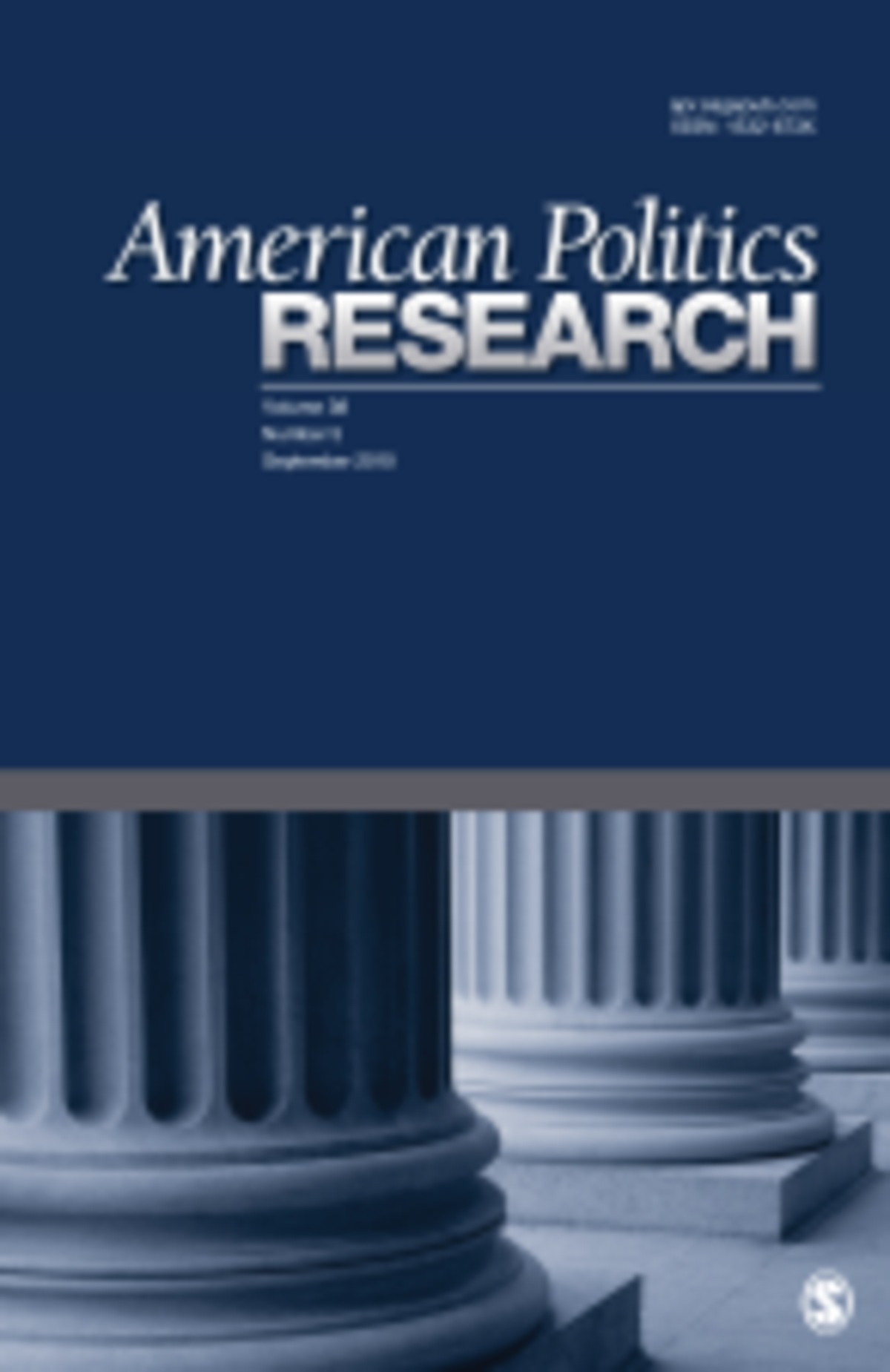 "Late-Deciding Voters in U.S. Presidential Elections" With Salil Benegal (Union College). American Politics Research. Forthcoming. Link to Online Article.
"Late-Deciding Voters in U.S. Presidential Elections" With Salil Benegal (Union College). American Politics Research. Forthcoming. Link to Online Article.
Abstract: What leads some voters to delay their voting decision until just before Election Day while others make up their mind well in advance? Focusing on American presidential elections this research note evaluates reasons why individuals might delay their voting decision. Using data from the ANES time series between 1948 and 2020, the paper finds that late-deciding voters tend to be younger, are ambivalent toward the major candidates, less likely to be partisans, and be less interested in the campaign than those who decide early in the campaign.
_______________________________________________________
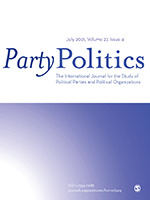 "The Impact of Political Party Control on Redistributive State Wage Policies Since 1968." With Christopher Dennis (CSULB), Stavros Papadopoulos (UConn PhD), Amy Widestrom (Arcadia). Party Politics. Forthcoming. Link to Online Article.
"The Impact of Political Party Control on Redistributive State Wage Policies Since 1968." With Christopher Dennis (CSULB), Stavros Papadopoulos (UConn PhD), Amy Widestrom (Arcadia). Party Politics. Forthcoming. Link to Online Article.
Abstract: This study examines how partisan control of state government influences three important state wage policies over the 1968 – 2018 period: minimum wage laws, prevailing wage laws, and right-to-work laws. Using time series fixed-effects regression and probit event history analysis we find that Unified Democratic control of a state’s government results in more egalitarian wage policies while Unified Republican control leads to less egalitarian wage policies.
_______________________________________________________
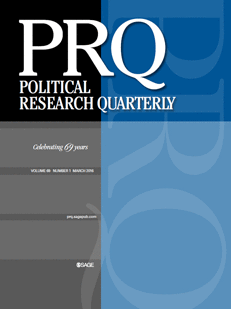 “The Democratic Majority and the 2016 Presidential Election″ with Evelyn Simien and Carolyn Conway (UConn PhD candidate). 2024. Political Research Quarterly 77: 371-85. Link to Online Article
“The Democratic Majority and the 2016 Presidential Election″ with Evelyn Simien and Carolyn Conway (UConn PhD candidate). 2024. Political Research Quarterly 77: 371-85. Link to Online Article
Abstract: Scholarship on women voters using an intersectional lens has shown feminists and women of color within the Democratic Party to be a powerful force in electoral politics—specifically, Black and Latina women—are the most reliable voters. Combined, they represent the majority of women voters in the Democratic Party, and they have shown themselves to be a sizable voting bloc in the last two American presidential election cycles. Using data from the 2016 American National Election Studies (ANES), we demonstrate important differences in support for the Democratic candidate (Hillary Clinton) between feminists and women of color—Black and Latina—underscoring the need to study gender, race, and ethnicity simultaneously (versus independently) when they are co-constitutive identity categories. By examining women and the groups the Clinton campaign appealed most to—feminists, Black, and Latina women—we add to the scholarship in political science that followed this unique election and demonstrate the importance of feminist identity for vote choice and various modes of political behavior for women voters. Knowing and understanding how women respond through affect and how this affect can result in political behaviors will help determine what it takes for future historic first candidates to emerge successful.
________________________________________________________________________
 "Immigration and Public Opinion: Will backlash impede immigrants’ policy progress?" 2021. With Benjamin G. Bishin, Matthew Incantalupo, and Charles Anthony Smith. Social Science Quarterly. Link to Online Article
"Immigration and Public Opinion: Will backlash impede immigrants’ policy progress?" 2021. With Benjamin G. Bishin, Matthew Incantalupo, and Charles Anthony Smith. Social Science Quarterly. Link to Online Article
AbstractObjective: We investigate the question: How should immigrants pursue policy in a system that privileges majority rule? Scholars suggest that opinion backlash impedes policy gains by marginalized groups. That is, pushing too hard for policy leads to backlash, a sharp and sustained negative reaction among citizens that delays these groups’ ability to obtain their desired policy. Methods: Examining immigration, we develop and test two plausible alternatives to backlash: opinion elite cues and opinion stability. We use experimental and observational data. Results: We find no evidence of backlash. Instead, we find modest evidence attitudes move in the direction of the cues provided by party elites. Conclusion: Immigrants and other marginalized groups should pursue rights without fear of opinion backlash.
________________________________________________________________________
“Do Elected Officials Serve the Poor on Health Care? Evidence from a Field Experiment on Members of Congress and State Legislators.” 2020. With Benjamin G. Bishin. Social Science Journal. Link to Online Article

Abstract: To what extent do legislators respond to the poor? While extensive research demonstrates the poor are largely ignored in legislators’ policy calculations, little research examines the degree to which they discriminate against the poor with respect to providing constituency service. We examine this question using a series of correspondence experiments on both the offices of members of Congress and state legislators on the topic of health care. Consistent with Carnes & Holbein (2019) we find no evidence that members of Congress discriminate by economic class and only mixed evidence that state legislators discriminate along these lines. We also find limited, but potentially important, evidence of biases in responsiveness by legislator party for state legislators.
________________________________________________________________________
“Elite Mobilization: A Theory Explaining Opposition to Gay Rights.” 2020. With Benjamin G. Bishin, Matthew Incantalupo, and Charles Anthony Smith. Law & Society Review 54: 233-264. Link to Online Article
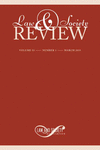
Abstract: Media and scholastic accounts describe a strong backlash against attempts to advance gay rights. Academic research, however, increasingly raises questions about the sharply negative and enduring opinion change that characterizes backlash among the mass public. How can we reconcile the widespread backlash described by the media with the growing body of academic research that finds no evidence of the opinion change thought to be its hallmark trait? We argue that rather than widespread opinion change, what appears to be backlash against gay rights is more consistent with elite-led mobilization—a reaction by elites seeking to prevent gays and lesbians from achieving full incorporation in the polity. We present evidence from what is widely considered to be a classic case of anti-gay backlash, the 2010 Iowa Judicial Retention Election. Analysis of campaign contribution data in Iowa vs. other states between 2010 and 2014, and voter roll-off data exploiting a unique feature of the 2010 retention election supports this argument. The results simultaneously explain how reports of backlash might occur despite increased support for gay rights, and an academic literature that finds no evidence of backlash.
________________________________________________________________________
“Viewing Equality as a Loss: How Highlighting Policy Costs and Benefits Influences Attitudes.” 2020. With Christopher Guay.Social Science Journal. Link to Online Article

Abstract: As economic and political inequality has increased in recent decades, scholars and policymakers have turned their attention to the American public’s reaction and response to this phenomenon. While most opinion polls demonstrate Americans general dislike of both economic and political inequality, there have been few implementations of policy that would reverse the trend of rising economic inequality or the outsized role that the wealthy have over policy. Moreover, redistributive tax policies put to direct vote at the state level have generally not fared well. Under what conditions might Americans be more likely to support policy that increases political equality by reducing unequal influence? Why might Americans vote against or oppose redistributive tax policies even though they object to rising economic inequality? We conduct two survey experiments highlighting costs and benefits of inequality reducing policies. Using data from the CCES and Amazon Mechanical Turk, we find that respondents can shift their support for inequality reducing policy in response to costs yet rarely change opinions when exposed to potential benefits. Our findings suggest individuals can be swayed more by messages highlighting the costliness of redistributive tax policy rather than the potential benefits, suggesting loss aversion may be one explanation for why specific redistributive tax policies can be rejected.
________________________________________________________________________
“Durable Democracy? Economic Inequality and Democratic Accountability in the New Gilded Age.” 2019. With Benjamin J. Newman (UCR). Political Behavior 41: 5-30. Link to Online Article

Abstract: Scholarship in the U.S. provides mounting evidence of a linkage between economic inequality and inequality in representation and policymaking. In response, this article addresses a research question striking at the very heart of the resilience of the democratic capitalist design: Do voters punish elected officials for inequality? We advance the argument that voter punishment of incumbents for inequality will occur when inequality is locally salient and for officeholders that support inequality-enhancing legislation. Relying upon secondary analysis of large-N national survey data, we find that voters residing in high inequality contexts voted against incumbents who supported regressive tax policies and opposed minimum wage increases. Interestingly, for inequality-attenuating incumbents, we find increased support among voters in high inequality contexts. Importantly, robustness checks reveal that observed punishment effects hold for Democratic and Republican incumbents. We conclude by discussing the implications of our findings for American democracy in an era of rising inequality.
________________________________________________________________________
“The Effect of Political Parties on the Distribution of Income in the American States: 1917-2011.” 2018. With Amy Widestrom (Arcadia) and Christopher Dennis (CSULB). Social Science Quarterly99: 895-914. Link to Online Article

Abstract:Objectives. This article examines the effects of partisan control of government on income distribution within the United States.Methods. Using newly available data, we estimate the effects of unified Democratic and Republican Party control at the state and national levels on the share of income going to the top 1% of income earners, by state, between 1917 and 2011.Results. We find that unified party control at the state level has minimal impact on income going to the top 1% of income earners within the states, but that unified party control at the federal level does have an effect. Moreover, we find that over the long-term, unified Democratic control at the federal level leads to less income going to the top 1%, while unified Republican control increases income going to top earners.Conclusions. Despite the increased focus on federalism and state policy in studies of income inequality, our findings suggest that federal level political factors are important for understanding the share of income going to the top income earners in the United States, particularly in the contemporary era.
- Access articlepdf here
__________________________________________________________________________
“The Influence of Inequality on Welfare Generosity: Evidence from the US States” With Lyle Scruggs (UCONN). 2017. Politics & Society 45: 35-66. Link to Online Article

Abstract: This article examines the relationship between income concentration and policy outputs that determine the generosity of two major state-level safety net programs: unemployment insurance and cash social assistance. Using a difference in differences framework, it tests the degree to which the top 1 percent share is associated with benefit replacement rates for these programs during the period 1978–2010. The results suggest that higher state income inequality lowers those states’ welfare benefits significantly in ways consistent with a “plutocracy” hypothesis that has been suggested in work by scholars such as Bartels, Bonica, Gilens, and Page. The results are robust to controls for several alternative explanations for benefit generosity, including citizen ideology, party control of government, fiscal pressure on programs, state racial heterogeneity, and public opinion liberalism. The results thus support the notion that growing income concentration at the very top undermines social protection policies.
________________________________________________________________________
“Bankruptcy Reform and Congressional Action: The Role of Organized Interests in Shaping Policy” 2017. Social Science Research64: 66-78. Link to Online Article

Abstract: This paper tests the degree to which PAC contributions can influence voting outcomes on legislation that disproportionately influences the poor. Using passage of the Bankruptcy Abuse and Consumer Protection Act of 2005 in the House of Representatives, the results show an association between PAC campaign contributions from the financial industry and support for final passage of bankruptcy reform. The findings suggest that one source of underrepresentation of the poor may be donations made by interest groups during campaigns.
____________________________________________________________________

“Opinion Backlash and Public Attitudes: Are Political Advances in Gay Rights Counterproductive?” with Benjamin G. Bishin, Matthew Incantalupo, and Charles Anthony Smith. 2016. American Journal of Political Science 60: 625-648. Link to Online Article
Abstract: One long recognized consequence of the tension between popular sovereignty and democratic values like liberty and equality is public opinion backlash, which occurs when individuals recoil in response to some salient event. For decades, scholars have suggested that opinion backlash impedes policy gains by marginalized groups. Public opinion research, however, suggests that widespread attitude change that backlash proponents theorize is likely to be rare. Examining backlash against gays and lesbians using a series of on-line and natural experiments about marriage equality, and large sample survey data, we find no evidence of opinion backlash among the general public, by members of groups predisposed to dislike gays and lesbians, or those with psychological traits that may pre-dispose them to lash back. The important implication is that groups pursuing rights should not be dissuaded by threats of backlash that will set their movement back in the court of public opinion.
- Winner of the 2014 APSA Bailey Award for Best Paper in LGBT Politics.
- Co-Winner of the 2015 Best Conference Paper Award from the APSA Law and Courts section.
- Access articlepdf here
- Check out our LSE blog post about this articlehere
- Check out our Monkey Cage blog posts about this articlehere andhere
____________________________________________________________________

"Fiscal Policy and Economic Inequality in the U.S. States: Taxing and Spending from 1976-2006″ with D. Xavier Medina Vidal (Virginia Tech). 2015. Political Research Quarterly68: 392-427. Link to Online Article
Abstract: To what extent can state governments influence economic inequality? How do state fiscal policies of redistribution affect families in different economic situations? Using a large database of state fiscal policymaking tools (taxing and spending) between 1976 and 2006 we examine the effect of these tools on state level inequality as well as the average incomes of families in different economic groups. We find that state taxing and spending efforts can influence these indicators of economic inequality, though these fiscal policy tools can have differential effects. Spending on unemployment compensation and cash assistance as well as revenue from taxes on corporations are found to reduce state level inequality. We also find unemployment compensation to positively benefit the bottom 10thpercentile of income earners, while the inheritance tax helps all income groups. Corporate tax revenue is associated with higher middle class incomes, while income tax revenue benefits both middle and upper incomes. Sales tax revenue positively benefits wealthy earners. Higher property tax revenue is associated with decreased income for all groups. These results suggest that state governments can affect redistribution through fiscal policies, by affecting both state level inequality as well as the economic fortunes of different income groups.
_______________________________________________________
“State Adoption of Tax Policy: New Data and New Insights.” with Christopher Dennis (CSULB). 2014 American Politics Research 42: 929-955. Link to Online Article

Abstract: This paper examines the factors that influence two important areas of state tax policy—the adoption of an income tax as well as whether a state permits deducting federal income taxes against state individual income taxes. We focus on a factor that has largely been unexplored, the flow of income going to the top 1 percent of earners. Employing data during two different time periods (1916-1937 & 1960-2003), we find that the share of income received by the richest 1% of taxpayers corresponds with both the likelihood states will adopt an income tax as well as whether states allow deductions of federal income tax against state individual income taxes.
_______________________________________________________
Thomas J. Hayes. 2014. “Do Citizens Link Attitudes with Preferences? Economic Inequality and Government Spending in the New Gilded Age.” Social Science Quarterly 95: 468-495. Link to Online Article
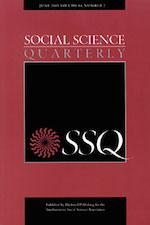
Abstract: Objective: This paper investigates the extent to which people link policy preferences with unequal outcomes. As the American public is both aware and supportive of reducing income inequality, it is an open question whether this concern is translated into support for policies that might help alleviate the rise in economic inequality. Methods: Ordinary Least Squares (OLS) regression and Ordered Logit Regression are used with data from the 1996 General Social Survey (GSS). Results: People do in fact match views on income inequality with spending preferences, signifying that people who are concerned about inequality also favor government programs that could help alleviate these disparities. Moreover, the least well off are more attuned than the upper or middle class at linking attitudes about inequality with government spending preferences. Conclusion: The main findings suggest that because citizens are able to link attitudes about inequality with spending preferences, popular sovereignty could be under duress as wealth inequality expands.
- Access articlepdf here
_______________________________________________________
Thomas J. Hayes. 2013. “Responsiveness in an Era of Inequality: The Case of the U.S. Senate.”Political Research Quarterly: 66: 585-599. Link to Online Article

Abstract: To what extent do members of Congress respond unequally to people in different economic situations? How does partisan control of the agenda change the way in which Senators respond to the poor? Using data from the 2004 National Annenberg Election Survey, and multiple roll call votes, I examine Senate responsiveness for the 107th through 111th Congresses. The results show consistent responsiveness toward upper income constituents. Moreover, Republicans are more responsive than Democrats to middle-income constituents in the 109th Congress, and a case study of the 107th Senate reveals that responsiveness toward the wealthy increases once Democrats take control of the chamber.
_______________________________________________________
Thomas J. Hayes and Benjamin G. Bishin. 2012. “Issue Salience, Subconstituency Politics, and Legislative Representation” Congress and the Presidency 39: 133-159. Link to Online Article
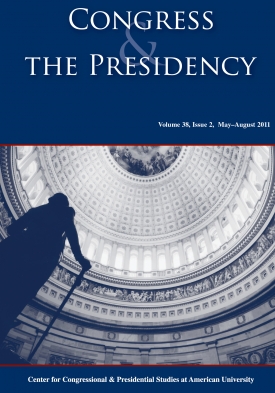
Abstract: To what extent are citizens able to control their elected officials? Does representation improve when issues become visible? Conflicting results in studies of legislative representation are frequently attributed to issue salience or subconstituency politics. However, most conclusions about the effect of issue salience rely on studies of responsiveness on issues held to be either important or visible. Consequently, we have little idea of how changes in salience serve to alter the representational relationship. To examine this question, we employ a natural experiment to exploit the sudden increase in issue visibility surrounding the consideration of the Armenian Genocide Resolution. We are unable to detect any evidence that salience (as measured by visibility) enhances responsiveness to majority preferences. Instead, salience appears to alter legislators’ sensitivity to different intense subconstituency groups in their districts.
- Access article pdf here
_______________________________________________________
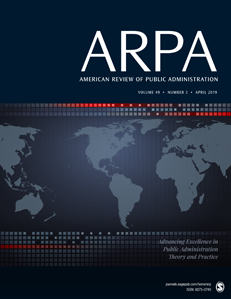
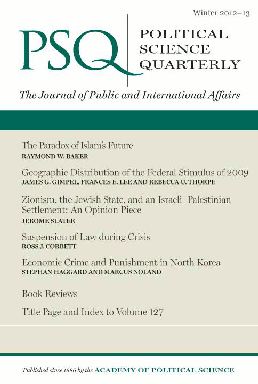
![]()
Book Reviews
Media/Blog Posts
- “How increasing wealth concentration and inequality leads to less generous state welfare policies” April 7th, 2017. USApp-American Politics and Policy blog (LSE)
- “Granting Gay Rights does not lead to public opinion backlash, even among Evangelicals.” October 13th, 2016. USApp-American Politics and Policy blog (LSE)
- “Economic inequality: still on the presidential agenda, still much more to be done.” June 1st, 2016. USApp-American Politics and Policy blog (LSE)
- “Obama’s highlighting of economic inequality poses a dilemma for the Republican Party in the lead up to 2016.” January 26th, 2015. USApp-American Politics and Policy blog (LSE)
- “How States can influence inequality with taxing and spending tools.” June 6, 2015. USApp-American Politics and Policy blog (LSE)
- “Some Supreme Court Justices worry that a gay marriage ruling will provoke public backlash. They Shouldn’t be concerned.” with Benjamin Bishin, Matthew Incantalupo, and Anthony Smith. April 30th, 2015. The Monkey Cage
- “Obama’s Highlighting of Economic Inequality Poses Dilemma for Republican Party in the Lead up to 2016.” January 26th, 2015. USApp-American Politics and Policy blog (LSE)
- “States With a Higher Concentration of Income Going to the Top 1% Are More Likely to Adopt an Income Tax.” July 17th, 2014. USApp-American Politics and Policy blog (LSE)
- Guest on Scholars Circle radio program, November 17th, 2013.
- “Senators of Both Parties Respond to Preferences of Wealthy, Ignore the Poorest.” October 1st, 2013. USApp- American Politics and Policy blog (LSE)
- “Should We Fear Opinion Backlash on Gay Marriage?” with Benjamin Bishin, Matthew Incantalupo, and Anthony Smith. June 18th 2013. The Monkey Cage